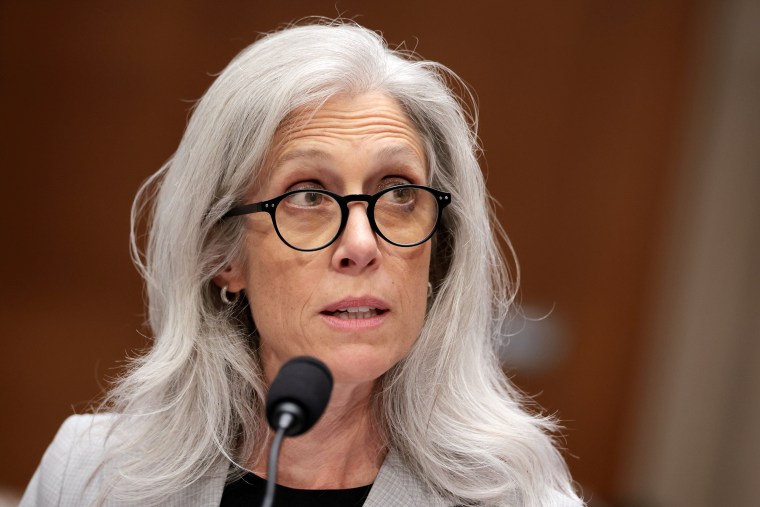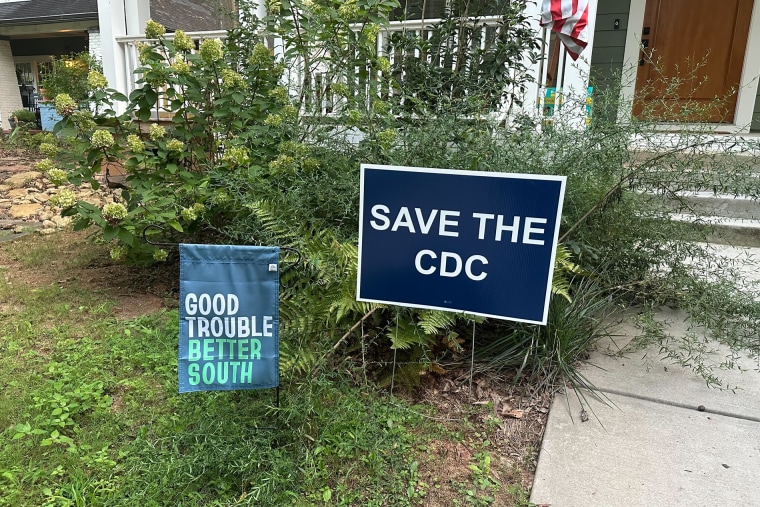CDC Director Susan Monarez fired by Trump administration after refusing to resign, citing 'reckless directives'
The Centers for Disease Control and Prevention leadership was in stunning disarray Wednesday evening after the Trump administration fired the agency’s director hours after she refused to resign under pressure.
The director, Susan Monarez, said she was resisting being ousted by the nation’s top health official, Robert F. Kennedy Jr., for political reasons after about a month in office.
“When CDC Director Susan Monarez refused to rubber-stamp unscientific, reckless directives and fire dedicated health experts, she chose protecting the public over serving a political agenda. For that, she has been targeted,” said her lawyers, Mark Zaid and Abbe Lowell.
“Dr. Monarez has neither resigned nor received notification from the White House that she has been fired, and as a person of integrity and devoted to science, she will not resign,” added the attorneys, who did not reply to a request for comment.
The White House fired back shortly afterward, formally terminating Monarez.
“As her attorney’s statement makes abundantly clear, Susan Monarez is not aligned with the President’s agenda of Making America Healthy Again. Since Susan Monarez refused to resign despite informing HHS leadership of her intent to do so, the White House has terminated Monarez from her position with the CDC,” White House spokesman Kush Desai said.
Just after midnight Thursday, Zaid pushed back, saying on Bluesky: “As a presidential appointee, senate confirmed officer, only the president himself can fire her.” He added that “she remains as CDC Director.”
That volley capped an evening of public spectacle at the CDC. It started around 5:30 p.m., when the Department of Health and Human Services, which oversees the CDC and which Kennedy leads, said on X that “Monarez is no longer director” of the agency. “We thank her for her dedicated service to the American people,” the post continued.
That sparked a near-immediate leadership exodus from the CDC, which is charged with safekeeping the public health of the more than 300 million people in the United States.
At least four top officials announced their resignations, including Dr. Debra Houry, the chief medical officer; Dr. Demetre Daskalakis, director of the National Center for Immunization and Respiratory Diseases; Dr. Daniel Jernigan, the director of the National Center for Emerging and Zoonotic Infectious Diseases; and Dr. Jen Layden, director of the Office of Public Health Data, Surveillance and Technology.
 CDC Director Susan Monarez testifies at her confirmation hearing June 25.Kayla Bartkowski / Getty Images file
CDC Director Susan Monarez testifies at her confirmation hearing June 25.Kayla Bartkowski / Getty Images fileKennedy, a longtime anti-vaccine activist, has been a controversial figure to lead the country’s health agencies. He has cut $500 million in contracts focused on developing mRNA vaccines, drawing sharp criticism from the scientific community and former government officials, and under his guidance, HHS has made a number of vaccine policy decisions that limit access to vaccines or call vaccine safety into question in recent weeks.
Some of those sentiments were echoed by the officials who resigned. In his resignation letter, Daskalakis wrote, “I am not able to serve in this role any longer because of the ongoing weaponizing of public health.”
Houry’s resignation letter spoke about the continued spread of misinformation around vaccines.
“Recently, the overstating of risks [of vaccines] and the rise of misinformation have cost lives, as demonstrated by the highest number of US measles cases in 30 years and the violent attack on our agency,” she wrote.
CDC staffers said they were shocked by the developments.
“These guys are the best in the business. They know their stuff,” said a CDC staffer who requested anonymity for fear of retaliation. “I’m stunned how fast this all happened.”
The departures come at a tumultuous time for the agency.
On Aug. 8, a gunman shattered windows of six buildings of the CDC campus in Atlanta. A police officer died in the shooting. Several days after the shooting, Monarez sought to reassure staffers during a virtual meeting.
“We know that misinformation can be dangerous,” she said during the meeting, according to a transcript obtained by NBC News. “Not only to health, but to those that trust us and those we want to trust. We need to rebuild the trust together.”
The CDC employee said that although Monarez hadn’t been in leadership for long, it “seemed like she was a fairly strong advocate for CDC employees. She was the only one to take the shooting seriously.”
President Donald Trump has not made any public statements about the shooting.
In March, Trump picked Monarez as his nominee to head the CDC. Monarez’s previous work involved using artificial intelligence to improve health. Before she joined the CDC, Monarez was deputy director of the Advanced Research Projects Agency for Health, a research funding agency focused on biomedical innovations. The Senate confirmed her nomination in late July.
 Signs around Atlanta show support for the CDC.Priya Sridhar / NBC News
Signs around Atlanta show support for the CDC.Priya Sridhar / NBC NewsOn Friday, Monarez canceled a meeting with CDC staff members that had been scheduled for Monday. The focus of the meeting was to have been safety concerns and security enhancements after the shooting.
“Unfortunately, we need to postpone Monday’s event for an HHS meeting that I have been asked to attend in person in DC,” Monarez wrote in an email to CDC staff members seen by NBC News.
Dr. Mandy Cohen, a former CDC director under President Joe Biden, said: “We lost exceptional leaders who have served over many decades and many administrations. The weakening of the CDC leaves us less safe and more vulnerable as a country.”
Michael Osterholm, an infectious disease expert and the director of the Center for Infectious Disease Research and Policy at the University of Minnesota, said in a statement that the “departures are a serious loss for America.”
“The loss of experienced, world-class infectious disease experts at CDC is directly related to the failed leadership of extremists currently in charge of the Department of Health and Human Services,” he said.
Osterholm is launching the Vaccine Integrity Project as a potential alternative to the CDC’s Advisory Committee on Immunization Practices. In June, Kennedy fired all 17 ACIP members and replaced them with his own picks, including several Covid vaccine skeptics.
With Monarez's firing, the agency returns to the leaderless state it has been in for the majority of the new Trump administration. Trump’s original pick for director, Dr. David Weldon, was pulled from consideration hours before his confirmation hearing in March. Weldon, a former congressman from Florida, had a history of questioning vaccine safety.
Monarez was briefly the agency’s acting director before she was nominated in Weldon’s place.